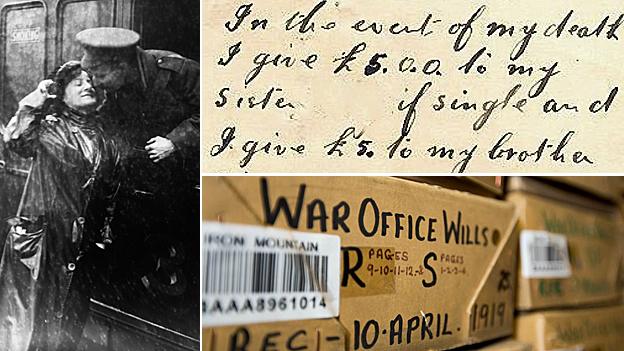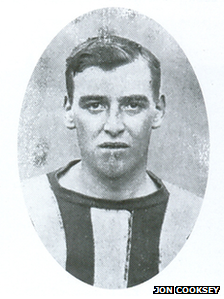World War I soldier wills digitised for online archive
- Published

Handwritten wills were kept by troops in their pocket service books and tucked into their uniforms
The last wishes, thoughts and concerns of more than 230,000 soldiers who died on the front line during World War I are to be made available online.
Final handwritten wills were kept by troops in their pocket service books and tucked into their uniforms.
Now those original paper records that survived are preserved in 1,300 boxes inside a temperature-controlled warehouse run by data company Iron Mountain in Birmingham.
The wills, which are owned by Her Majesty's Court and Tribunal Service (HMCTS), are being digitised in time for next year's centenary of WWI., external
The huge online archive is also as part of a larger project to make all war wills publicly available, dating from the Boer War to the Falklands.
BBC News was given access to the first batch to be made available online, including those of a former professional footballer and the grandfather of rock musician Mick Fleetwood.
Private Harry Lewis-Lincoln, 26, 1st Bedfordshire regiment

Pte Harry Lewis-Lincoln was killed while fighting with his regiment on Hill 60 near Ypres, in Belgium, on 5 May 1915.
The pocket book which contained his will also had a letter, in common with many, addressed to a woman believed to be his sweetheart back in England.
The letter explains: "On Friday morning we are going round the coast straight to Belgium, I am not supposed to tell you this."
Military historian Jon Cooksey believes the letter would never have been sent out because it would have been regarded as sensitive material.
"If the Germans had got hold of that information it could have been disastrous because they always wanted to know where units were and the movements of troops," he says.
"It also talks about how some troops were expecting a 'hard and long' war, a detail that would never have been mentioned back home as not to damage morale."
The letter also mentions a boy who is believed to be Mr Lewis-Lincoln's son.
It reads: "If I never come home again I leave the boy in your charge and I know you will do the best to him."
Private Joseph Ditchburn, 24, Durham Light Infantry

While some soldiers pour out their thoughts and concerns to their loved ones, Pte Joseph Ditchburn appears more concerned with what could be considered more mundane matters.
His will has an accompanying letter which shows he had left all of his clothes and his bicycle to his mother, who is referred to as Mrs Moralee.
The letter, written on headed notepaper, gives the address of a bike repair shop in Lichfield, Staffordshire - and strict instructions.
It reads: "It is a very nice machine and worth a lot of money and I have paid for its repair and if there is any extra to pay, pay for it."
Pte Ditchburn was shot in the abdomen fighting German troops with the Durham Light Infantry in Armentieres, on the France-Belgium border, on 13 October 1914.
He died from his wounds in hospital.
Jon Cooksey says the will gives an indication of what a "colourful character" the soldier was.
"His medical report shows he had tattoos all over his arms and his body," he says.
"He had several charges and reprimands throughout his career, including telling a falsehood to a sergeant and speaking in an improper manner to a senior officer.
"We always have this image of soldiers as these upstanding members of society but some of them could be rascals as well."
Corporal Albert Victor Butler, 29, 17th (Service) Battalion Middlesex Regiment

Cpl Albert Victor (Ben) Butler was a professional footballer for Reading and Queens Park Rangers.

Albert Victor Butler played for Reading and QPR
The 17th (Service) Battalion Middlesex Regiment, with which he served, was also known as the First Footballers' Battalion.
But even if he had survived the war, the soldier would never have again played the sport professionally; his right leg was shattered during shelling on the trenches at Cite Calonne on 3 May 1916.
He died from his injuries in a military hospital 10 days later.
Jon Cooksey says his final days are documented in an account written by an Army chaplain, the Reverend Samuel Green.
"The statement is an emotional one and ends with the words 'He has played the game. I doubt not he has won. A fine fellow - may he rest in peace'."
In his will he leaves "all my property and effects" to his wife Kate Butler.
Mr Cooksey said the wills were crucial documents for descendants to cast some light on what a life was like at that time.
"[The wills] are giving us real nuggets of information which are filling the gaps in a man's service record, because it's not just about the military side, it's about their role in society and the backgrounds they came from.
"These men were leaving families behind, they were part of the fabric of their community.
"Their deaths were felt by whole villages, towns, not just their loved ones, and in this case - supporters of a football club."
Private John Henry Fleetwood, 32, York and Lancaster regiment (6th Battalion)

Pte John Fleetwood was the grandfather of musician Mick Fleetwood, the founder of the rock band Fleetwood Mac.
A boilermaker by trade, he enlisted in the York and Lancaster Regiment (6th Battalion).
Pte Fleetwood served in Gallipoli but was taken ill with severe dysentery and taken to a hospital in Pieta in Malta, where he died on 30 December 1915. He is buried on the island.
Jon Cooksey says: "It's amazing that a huge, world famous name has a link to 250,000 other families in this collection because of a man who did his duty and died for the Empire."
And he believes the fact the documents were handwritten makes them more emotive.
"If you look at the handwriting, it's in beautiful script, and you have to remember this was the first real army that Britain had amassed that was literate and educated," he said.
"The fact they are in the men's own handwriting gives their relatives a real tangible link to them and what they were feeling at that time."
John Apthorpe, from Iron Mountain, says: "The archive is not only a valuable source of information for historians, it gives the general public, here and overseas, the chance to get closer to their lost ancestors.
"We've so far found the wills of Victoria Cross winners, former footballers and relatives of famous people and these are just a fraction of the stories we're yet to uncover."
- Published5 November 2012
- Published11 October 2012
- Published8 June 2011
- Published14 July 2011